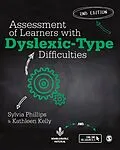Reinforcing best practice techniques, the second edition of this specialist guide for the assessment of learners with dyslexic-type difficulties includes:
- a new chapter on The Implications of Co-existing Specific Learning Difficulties
- updates to legislation including the SEND Code of Practice
- updates to specific diagnostic tests
- examples of interpreting test profiles
- photocopiable resources available to download from the website
This comprehensive guide enables teachers to understand a range of approaches to the assessment of children with dyslexic-type difficulties. It is an essential companion for those training to be specialist teachers of learners with dyslexia and a useful resource for all SENCOs, and teachers new or experienced.
Autorentext
Sylvia Phillips, BA, DASE, MEd (SEN), AMBDA, began her career as a teacher of English in secondary schools where she first became interested in why some learners had severe literacy difficulties. She later joined Manchester Metropolitan University where she was a Principal Lecturer, Head of SEN, and then Head of Continuing Professional Development. At MMU she developed the first courses for specialist dyslexia teachers at both undergraduate and postgraduate levels. During her time there, she also continued to work in primary, secondary and special schools both with teachers and directly with pupils. She developed and taught on SEN courses for teachers in the UK and was the UK partner (with Italy, Belgium and Spain) developing and teaching EU courses on 'Inclusion and SEN' for European educationalists. She has served on the Accreditation Board of the British Dyslexia Association, has been involved in several dyslexia research projects, and was a specialist member of the SEND Tribunal. She was course leader of the specialist dyslexia teachers' course at Glyndwr University, Wales, and is now a part-time tutor for the dyslexia programme at Stranmillis University College, and an Education Consultant.
She has co-authored Putting the Code to Work (Primary and Secondary editions, 1998, MMU - MET Publications), Inspection and Beyond (1997, Pearson), Management Skills for SEN co-ordinators (1999, Falmer Press), and A Multi-sensory Teaching System for Reading (1998, MMU Publishing), a fully scripted set of materials for teaching small groups of pupils with dyslexia.
Sylvia's other main areas of interest lie in 'learner voice', pupils' social, emotional and behavioural difficulties, and supporting teachers undertaking enquires into their practice.
Inhalt
PART I: Dyslexic-Type Difficulties and Assessment: Setting the Context
Chapter 1: Dyslexic-Type Difficulties: Implications for Assessment
Chapter 2: The Implications of Co-existing Specific Learning Difficulties
Chapter 3: Purposes and Forms Of Assessment
Chapter 4: Legislation, Policy and Practice
Part II: Starting the Process
Chapter 5: Identification and Screening
Chapter 6: Gathering Information from Others
Part III: Informal Approaches to Assessment
Chapter 7: Informal Approaches: Assessing Diffuculties in Reading
Chapter 8: Informal Approaches: Assessing Spelling Difficulties
Chapter 9: Informal Approaches: Assessing Difficulties in Handwriting
Chapter 10: Assessing Alphabetic Knowledge
Chapter 11: Assessing Cognitive Processing Skills
Chapter 12: Assessing Difficulties in Mathematics
Part IV: Formal Assessment
Chapter 13: Principles and Concepts of Psychometrics
Chapter 14: Standardised Assessment of Reading
Chapter 15: Standardised Assessment of Spelling and Handwriting
Chapter 16: The Assessment of Underlying Ability
Chapter 17: Standardised Assessment of Cognitive Processing Skills
Chapter 18: Standardised Assessment of Mathematics and Dyscalculia
Part V: Managing the Assessment Process
Chapter 19: Conducting Assessment
Chapter 20: Writing an Assessment Report
Chapter 21: Assessment by Other Professionals
